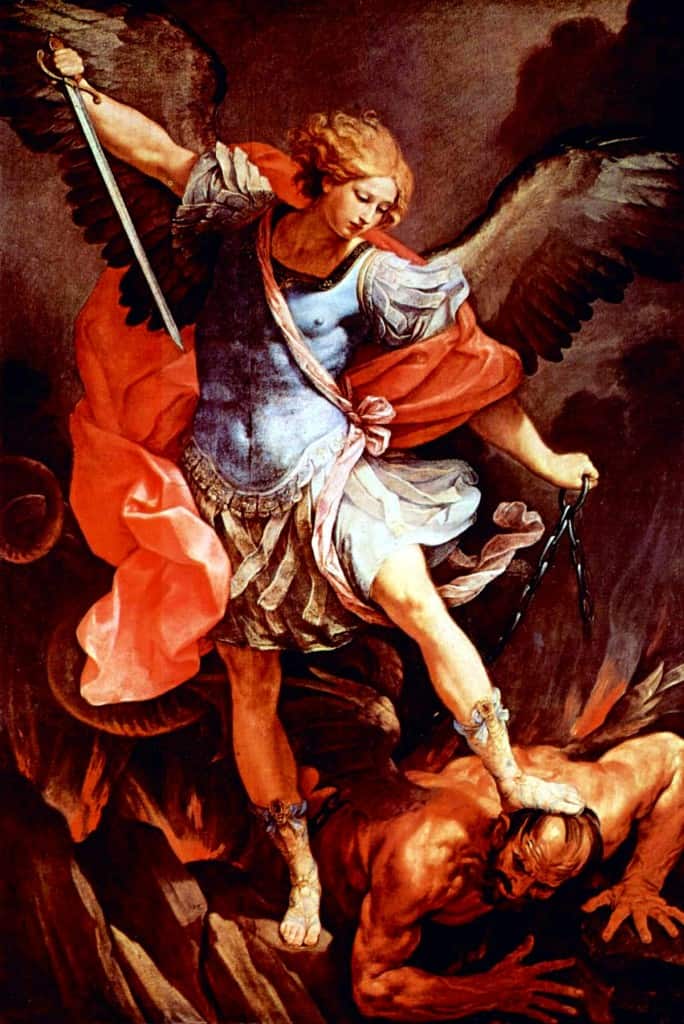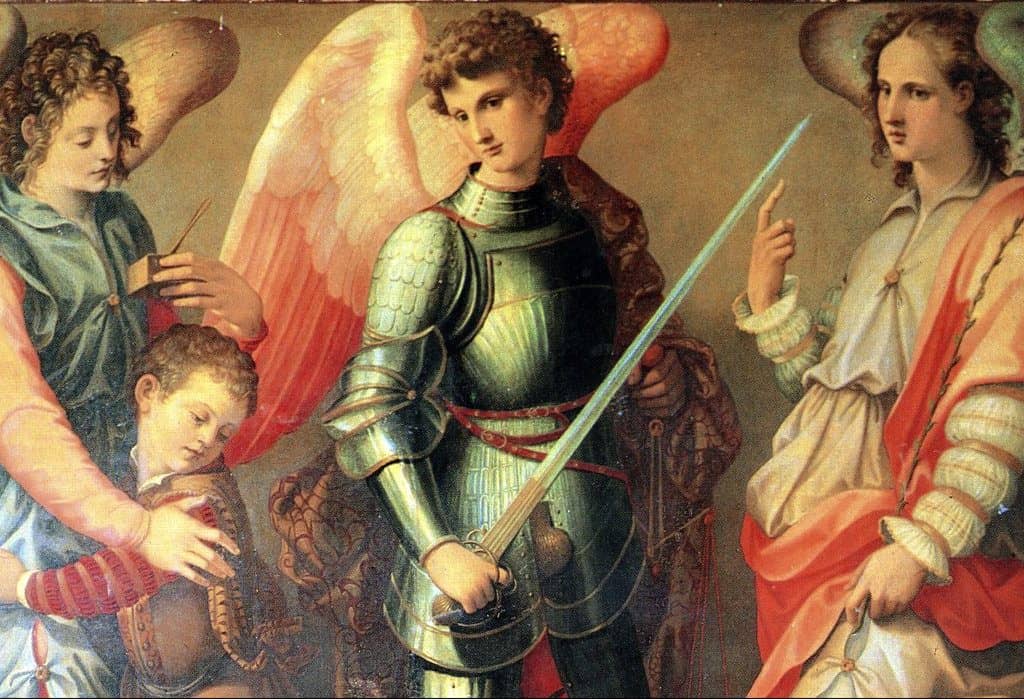Michael, Gabriel and Raphael are the three best-known of the seven principal archangels. In their struggle against Satan and his fallen angels, the archangels command the heavenly army.
September 29th Archangels’ Day
Archangel Gabriel
One of the seven archangels. His meaning is “God is my strength”.
Gabriel is in charge of communicating messages and news to the people. Gabriel is known as Jibril in the Islamic faith. He is represented with a lily or a trumpet, which he will use to announce God’s return.
Archangel Raphael
His name means “Brightness of Healing.” He can cure any illness in people.
According to legend, he gave Noah a book of medicine that included the solution to all diseases. He is shown holding a snake, which is a healing symbol, an arrow and a jar of balsam, the colors orange and light blue.
Archangel Michael
St. Michael, one of the seven archangels, also appears in the Bible along with Gabriel and Raphael. St. Michael is ranked first among the archangels by the Holy Church, which refers to him as the “Prince of the Heavenly Militia”.
Who is like God?
Who is comparable to God, Michael asks? Who, then, is greater, kinder and more just than God? Given the meaning of his name, we might ask: Who is St. Michael?
Who is St. Michael, from what or from whom does he defend us and what is his purpose?
He first appears as the great protector of God’s people in the Old Testament and his fierce protection is still present in the New Testament. He is represented as the victorious warrior angel of Lucifer, treading down the diabolical enemy, frightening him with his sword, or piercing him with his spear.
His feast is the oldest of those established in honor of angels and the only one celebrated in antiquity. He is usually represented holding a scale because he is the protector of justice.
Since the beginning of Christianity, people have venerated him as the person who drove Satan and his followers out of heaven by defeating them. He is considered both the guardian of the Christian army against the adversaries of the Church and the defender of Christians against demonic forces.
It is mentioned as the angel of worship and prayer, as well as the one who presents the departed to the light of Paradise: “the holy light promised to Abraham and his descendants”.
The Church teaches us through the liturgy that this archangel is appointed to guard Paradise and guide the elect.
At the hour of death, a fierce war is waged, because the devil has only a small window of opportunity to seduce us, drive us to despair or prevent us from finding peace with God. St. Michael protects at this time the person who is in the process of dying by his side.

Our defender is St. Michael
Along with strength, goodness is an important trait to play the role of protector. His goodness is commensurate with his strength. All angels serve to safeguard the humans under their command.
Now we may ask: Do we work as hard for our salvation as they do?
However, St. Michael serves as a model for us. He serves as an example of unity with God and reflection. He is an example of innocence and purity; he only thinks and longs for what is holy; he is a model of humility; he recognizes that God is all there is and that all must rid themselves of conceit, ambition and vanity.
He is also an example of zeal. He only wants to see God and his son, Jesus Christ, loved. St. Michael is an example of goodness.
Moving through every action with absolute composure, he demonstrates to us in no uncertain terms that patience, gentleness and modesty are the best defenses against our adversaries. In St. Michael, we discover the personification of all qualities.
Tradition teaches us that St. Michael presides over the worship offered to the Highest and presents to God the prayers of the fervent, represented by the incense that rises before the altar.
As our intercessor and bearer of the Church’s prayers before the Throne of God, St. Michael appears in the liturgy as the one who brings the incense and stands before the altar.
Note the Marian apparitions that have featured the appearance of St. Michael, as well as his connection to the Eucharist and the reverence due to the Holy Trinity and the Eucharistic Jesus.
Archangel Michael In the Old Testament
God sends St. Michael to lead Israel through the wilderness and to assure Daniel of his protection in the book of Daniel (Dan. 10:13-12:1).
The Lord spoke to the Israelites in Exodus (23:20): “To bring you to the place I have planned for you and to safeguard you on the journey, I will send an angel before you. Respect him and pay attention to what he says to you.”
Jude 9 depicts St. Michael debating with the devil and arguing over the dead body of Moses. St. Michael hid Moses’ tomb by God’s instructions, as both Satan and the people attempted to uncover it and convert the Israelites to idolatry.
St. Michael is also mentioned in 2 Macc. 11,6 y 15,22.
Today, Jews invoke the Archangel Michael to protect them from harm and to serve as the chief defender of the synagogue: “Michael, prince of mercy, pray for Israel,” they say at the end of their prayers on the Day of Atonement.
In the New Testament, the Archangel Michael appears
St. Michael again plays a crucial role by continuing his powerful defense. He wins the conflict with Satan and the rebellious angels, who are expelled from heaven, with the help of his angels. As a result, he is revered as the protector of the Church.
Then a battle took place in heaven between Michael and his angels and the Dragon, who counterattacked with his angels, but was finally defeated and expelled from heaven. Revelation 12:7-9.
Veneration and Adoration of St. Michael
Since the foundation of the Church, he has played a crucial role in its daily functioning. Numerous temporal and spiritual advantages have been attributed to him.
Victories over his adversaries were attributed to this archangel by the Roman Emperor Constantine, who built a splendid chapel in his honor near Constantinople.
This church became a popular destination for pilgrims and many sick people found relief there thanks to the intercession of St. Michael.
Why is St. Michael necessary?
We are commanded to invoke St. Michael and ask for his help in combating the demonic forces that have been unleashed in the modern world. We must rekindle our love for St. Michael the Archangel and join him in crying out:
“Who is like God?” in these times when the basic foundations of society are shaken because we deny God’s rights.
Worship of St. Michael
It is the best defense against disobedience and rebellion against the laws of God, as well as against skepticism, atheism and infidelity. (St. Francis of Assisi).
These vices are very frequent these days. More than ever, we need the help of St. Michael to maintain the Faith. Every facet of human society has been invaded by atheism and lack of faith.
We are engaged in a fierce spiritual conflict as individuals, as nations and as the Church. We must fight with compassion, strength and cunning, employing all available spiritual weapons.
Before the Cairo Conference in 1994, where important decisions were made about the moral and social destiny of humanity, His Holiness John Paul II urged all Catholics to pray the prayer of St. Michael for the intentions of the conference.
The enemy will surely be driven away if we have the strength to resist temptation and summon St. Michael, the prince of the heavenly army, to our aid. We must emulate his virtues, especially his humility and his love for the glory of God if we are to receive his protection.





